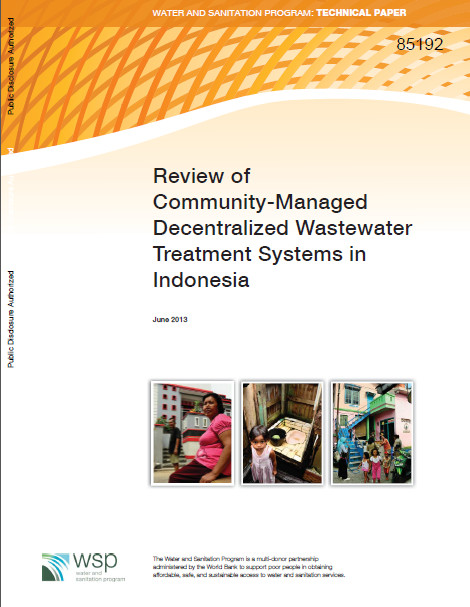Review of Community-Managed Decentralized Wastewater Treatment Systems in Indonesia
 |
report Jun 2013 ; 32 pages
Ed. WSP - Washington
Downloadable format: PdF
Downloadable from the publisher
Editor Presentation
Abstract:
Effective management of sanitation and wastewater is a growing challenge in dense urban settlements. Rapidly increasing urbanization and, along with that, rising settlement densities in low-income urban and peri-urban areas highlight the need for sanitation technologies and management systems that are robust and affordable, and which lessen the pollution load on local water sources. In many developing countries, centralized sewerage and wastewater treatment systems cover only a portion of larger urban areas, and are often not yet planned for smaller towns and densely populated, low-income areas of cities. On-site sanitation is often inappropriate in the denser settlements and slum areas, thus requiring intermediate and complementary solutions. Decentralized wastewater treatment systems (DEWATS) connected to simplified sewer systems or communal sanitation centers have the potential to close the gap between on-site and centralized systems. Community-managed DEWATS offer the possibility of swift sanitation improvements in high priority neighborhoods that communities can manage themselves, where local government does not yet provide a full sanitation service. This review explores Indonesia's experience in implementing community-managed DEWATS on a growing scale, and more specifically, whether community-managed DEWATS are a viable urban sanitation option for serving poor households in dense settlements.
Keywords: |
on site sanitation (CI) (DT) (ET) (ope) , wastewater treatment (CI) (DT) (ET) (ope) |
Country: |
Publisher/Broadcaster: |
|
WSP
-
Water and Sanitation Program - Washington - Usa |
If there is a broken link, we will be pleased to receive a message: communication@pseau.org